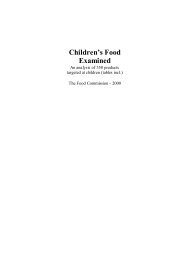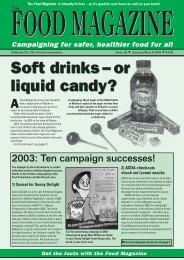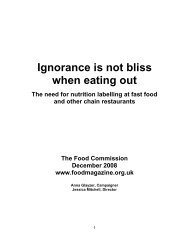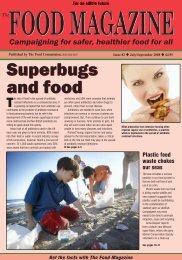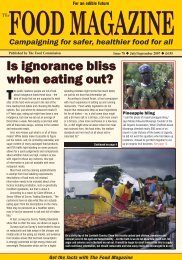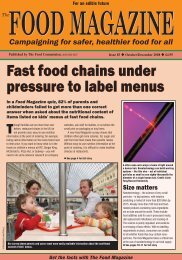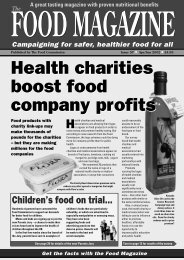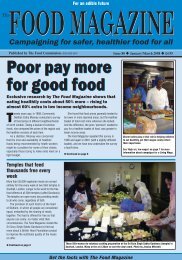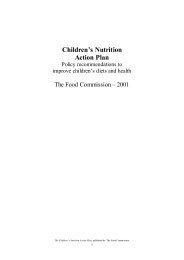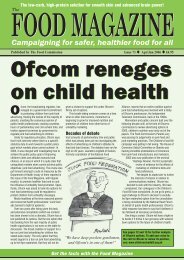Food Magazine - The Food Commission
Food Magazine - The Food Commission
Food Magazine - The Food Commission
Create successful ePaper yourself
Turn your PDF publications into a flip-book with our unique Google optimized e-Paper software.
feedback<br />
letters from our readers<br />
Sodium benzoate is very widely used in soft<br />
drinks as a preservative.<br />
<strong>The</strong>re's some controversy as to whether the<br />
sodium in these compounds contributes to effects<br />
such as raised blood pressure, associated with<br />
over-consumption of sodium as common salt<br />
(sodium chloride) in the diet. <strong>The</strong> main source of<br />
sodium is added salt in processed foods such as<br />
bread and cereals. Around 75% of our sodium<br />
intake comes from processed foods.<br />
Tackling wasteful plastic<br />
wrappers<br />
I read with interest the letter from David Crawford<br />
in the July/Sept issue of the <strong>Food</strong> <strong>Magazine</strong><br />
regarding the use of plastic wrappers for postage<br />
of the magazine. You may be interested to know<br />
of a company who will recycle polythene<br />
wrappers and bags (including food wrappers).<br />
<strong>The</strong> company name and address is:<br />
Polyprint Mailing Films,<br />
Mackintosh Road, Rackheath Industrial Estate,<br />
Rackheath, Norwich NR13 6LJ<br />
<strong>The</strong> company will happily receive clean<br />
polythene wrappers with all paper labels<br />
removed first and have been helpful in the past<br />
when I contacted them about a recycling project<br />
our village school was undertaking.<br />
Good Luck with the recycling!<br />
Hilary Schmidt-Hansen, Stratford upon<br />
Avon<br />
Thanks as well to readers Mrs Graham-Rack and<br />
David Linnell who also let us know about<br />
Polyprint Mailing Films. A spokesperson for the<br />
company confirmed that they are happy to<br />
receive any type 2 or 4 plastics (the soft,<br />
stretchy types) but did ask, as Hilary points out<br />
above, that any paper labels are removed before<br />
you send the plastic for recycling.<br />
PAN Memorial Lecture<br />
<strong>The</strong> Pesticides Action Network Rachel<br />
Carson Memorial Lecture will take place on<br />
1st December 2005.<br />
<strong>The</strong> event will feature a lecture by<br />
Professor Tyrone B. Hayes about his<br />
ground-breaking research showing that low<br />
levels of a widely used weedkiller Atrazine<br />
have a potent effect on the hormonal<br />
system, linked to prostate cancer in men<br />
and breast cancer in women.<br />
<strong>The</strong> lecture will take place at Middle<br />
Temple Hall in London, 6.30pm. Tickets<br />
cost £30 and include an organic buffet and<br />
wine.<br />
Call: 020 7065 0905<br />
Email: admin@pan-uk.org<br />
How traditional are<br />
transfats<br />
It makes me cross to see hydrogenated fat in the<br />
ingredients list of these supposedly 'traditional'<br />
biscuits. Grandma Wild's biscuits even has the<br />
cheek to say that they are 'baked to old recipes<br />
which have been used by us for over 90 years,<br />
using only the finest ingredients available'. I'm<br />
sorry, but hydrogenated fat is not a 'fine'<br />
ingredient in my book.<br />
Miryam Stennard, Wiltshire<br />
Hydrogenation was introduced in the early<br />
1900s, so this company may have used this<br />
ingredient for over 90 years! <strong>The</strong> difference is<br />
that when hydrogenation was invented, people<br />
were not aware of the health effects. Now that<br />
they are aware, manufacturers should be<br />
working to eliminate these fats from the food<br />
chain.<br />
We note that hydrogenated fat is the second<br />
ingredient in these biscuits by weight, which is<br />
especially concerning. <strong>The</strong> harmful effect of<br />
consuming hydrogenated fats is acknowledged<br />
by everyone, and there's really no excuse for<br />
hiding behind the notion of 'moderation' or<br />
'occasional treats'.<br />
Don’t trust the labels<br />
In our article on salty desserts in FM70 the <strong>Food</strong><br />
<strong>Commission</strong>’s researchers used sodium<br />
declarations on product labels to calculate the<br />
salt content of puddings. We are concerned that<br />
salt is hidden in places that people don’t expect.<br />
We have since discovered that both the<br />
Rumblers Bio yogurt and Morrisons own-brand<br />
tinned Strawberry Sponge Pudding had been<br />
mis-labelled by their manufacturers.<br />
According to the companies, Rumblers Bio<br />
yogurts contain 0.45g salt per serving, not the<br />
3.2g indicated by the label. <strong>The</strong> Morrisons<br />
Strawberry Sponge Puddings contain 0.6g salt<br />
per serving and not 6.0g as indicated by the<br />
label. Whilst we are pleased that these products<br />
are not as high in salt as they appeared, we are<br />
disappointed that the Morrisons product is still a<br />
high salt product (based on FSA guidelines).<br />
Can I eat<br />
salt to my<br />
heart’s<br />
content<br />
<strong>The</strong>se soya<br />
crisps (pictured<br />
above) tasted<br />
very salty when I<br />
tried them – I've<br />
pretty much<br />
reduced my salt intake recently and we never<br />
add it when cooking now. I was attracted to the<br />
crisps because I was told that eating soya is<br />
good for your heart, and there are lots of hearthealthy<br />
messages on the pack. But salt isn't<br />
good for your heart. That's right, isn't it And<br />
they do seem very salty. I'm confused.<br />
Rob Sallis, Hebden Bridge<br />
<strong>The</strong> soya heart health claims that appear on the<br />
pack are 'approved' claims that have been<br />
assessed by an organisation called the Joint<br />
Health Claims Initiative (JHCI: www.jhci.org.uk).<br />
<strong>The</strong>y examined the scientific evidence, and<br />
decided that eating 25g of soya protein per day as<br />
part of a diet low in saturated fat can help reduce<br />
blood cholesterol and maintain a healthy heart.<br />
But you're right – high salt consumption is<br />
linked to raised blood pressure, which in turn is<br />
linked to heart problems. That's why the JHCI<br />
would generally discourage approved health<br />
claims on products that contain high levels of<br />
potentially damaging components such as<br />
saturated fat and salt.<br />
<strong>The</strong> soya crisps are relatively low in saturated<br />
fat, but very high in salt. <strong>The</strong> official guideline is<br />
that a product contains 'a lot' of salt if it has 0.5g<br />
of sodium per 100g or more. This product has<br />
1.7g of sodium per 100g – more than three times<br />
the amount considered to be 'a lot'. Salt & vinegar<br />
crisps do tend to be the saltiest of the lot, so<br />
perhaps you could seek out different flavours.<br />
Dame Sheila McKechnie Award<br />
for Community <strong>Food</strong> Initiatives<br />
<strong>The</strong> <strong>Food</strong> Standards Agency will honour the<br />
influential campaigner Dame Sheila<br />
McKechnie, who died in January 2004, with<br />
an annual award that will provide two<br />
community food initiatives with £15,000 over<br />
a three year period. <strong>The</strong>se awards are<br />
designed to aid projects that work within a<br />
local community to help solve issues around<br />
food inequality. Full details and an application<br />
pack can be downloaded from<br />
www.food.gov.uk or obtained by emailing<br />
mckechnieward@foodstandards.gsi.gov.uk<br />
Alternatively phone <strong>The</strong> Consumer Insight<br />
Team on 020 7276 8170. <strong>The</strong> deadline for<br />
applications is 5th December 2005.



